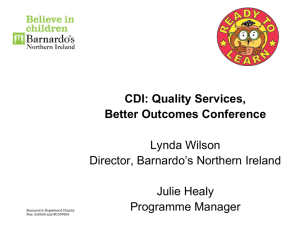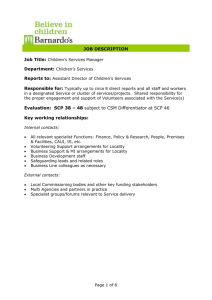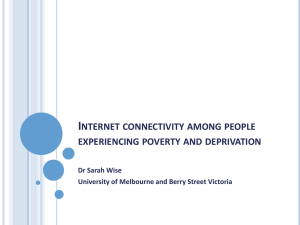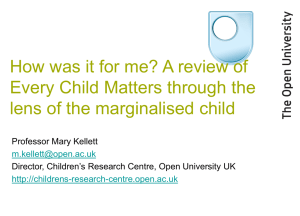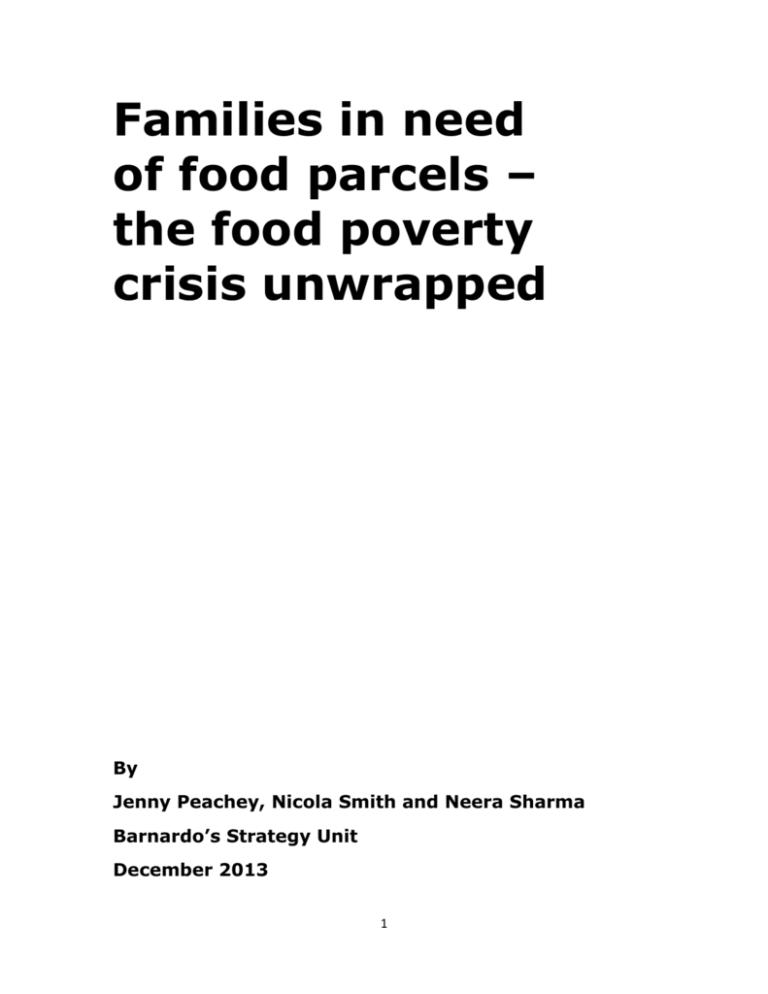
Families in need
of food parcels –
the food poverty
crisis unwrapped
By
Jenny Peachey, Nicola Smith and Neera Sharma
Barnardo’s Strategy Unit
December 2013
1
Executive Summary
“There is a distressing increase in the need to provide
support to young people and their families with direct
access to food parcels.” (Leaving Care Service
Manager, Scotland)
Barnardo’s has long provided support to the UK’s most vulnerable
children and young people. Barnardo’s works directly with over
200,000 children, young people and their families every year, and has
over 900 services across the UK. A significant number of these
services work with families who are living in poverty. Since 2012, we
have become increasingly aware that a growing number of families on
low incomes are struggling with the increased cost of living. This is
resulting in many people struggling to afford essentials including
heating and food. In the run up to Christmas 2012 we received a
number of reports from our services saying that they were increasingly
needing to refer families to food banks as families were unable to
afford sufficient food to feed themselves. This was identified as a
problem in the run up to Christmas but also throughout the year.
In November 2013 we conducted research to explore the growing
issue of food poverty amongst families and young people. This
comprised of a nationwide survey, conducted online, followed up with
in-depth interviews to find out the extent of the problem and whether
it was getting worse. 118 of Barnardo’s services responded. Those
services working primarily in areas affected by poverty and deprivation
responded.
This report provides a summary of this research, highlighting the
extent to which food poverty is an issue for our families and young
people, and provides some insight into why affording food is becoming
a growing problem for so many vulnerable families and young people.
The results of the survey and telephone interview showed worrying
trends.
Struggling to afford food at Christmas time – when
Christmas lunch is a food parcel
A key finding from the survey was that families were finding it
increasingly difficult to cope during the festive period. Many of our
services give out Christmas food parcels to families and young
people during this period, to help them cope with the added
pressures the festive period brings. These parcels typically include
food and sometimes small gifts, often donated by members of the
public or local businesses.
2
Over the past three years, almost half (46 per cent) of the services
who responded to the survey have made Christmas food parcels for the
families and young people they work with. Some services are also
providing other additional support to service users over the festive
period, for example, by putting on a Christmas lunch for care leavers to
provide them with food but also companionship over what is often a
difficult time for those who do not have their own family.
In addition to the difficulties faced at Christmas time, a growing
number of services reported working with families who were struggling
to afford basic provisions of food throughout the year. Many pointed to
families that were finding that their income from wages or benefits and
tax credits simply wasn’t keeping pace with the increased cost of basic
essentials like food and fuel. This was resulting in the finances of the
poorest families and young people being stretched considerably, with
families having to make difficult decisions. Many services felt the
problem was getting worse:
•
•
•
•
•
94 per cent of services reported that food poverty was an issue
for the families and young people they work with
90 per cent of services reported referring families and young
people to food banks in the past 12 months
94 per cent of those services making referrals to food banks
stated that the number of referrals made over the past 12
months had either stayed high or increased.
Almost half (45 per cent) of the services surveyed provide food
directly to the families and young people
86 per cent of the services surveyed provided help with
budgeting; 67 per cent provided cooking classes and 81 per cent
ran healthy eating sessions
3
Evidence of the extent of food poverty
Mounting evidence shows that there are a growing number of families
in the UK who are struggling to afford food. Over half a million children
in the UK are living in families that are unable to provide them with a
minimally acceptable diet. 1 Families struggling to afford food are being
forced to take a variety of measures, including adults skimping on
meals to protect their children from going without, 2 and shoppers
moving away from more expensive fruit and vegetables to processed
foods. Increasing numbers of people are turning to food banks, with
the Trussell Trust food bank network (the largest food bank network in
the UK) having provided 2,462 tonnes of emergency food to 346,992
people nationwide in 2012-13. 3 FareShare, a charity that redistributes
‘fit for purpose’ food otherwise destined for landfill, fed 43,700 people
between April 2012 and May 2013.4
Families with children are being particularly impacted upon; singleparent households and households with young children are reported to
be making the largest switches away from fresh fruit and vegetables to
processed foods. 5 In May 2013 Barnardo’s published a report on the
effect of inflation on low income families. 6 This report revealed that
many families are struggling with the increased cost of essentials.
These families had no choice but to make cut backs in their spending
such as moving away from fresh fruit and vegetables in order to make
ends meet.
1
Gordon et al (2013) Living Standards in the UK: PSE UK first summary report. A
minimally acceptable diet for children is defined as, ‘three meals a day; fresh fruit
and vegetables every day; and meat, fish or a vegetarian equivalent at least once a
day’. Available on line at:
http://poverty.ac.uk/system/files/attachments/The_Impoverishment_of_the_UK_PS
E_UK_first_results_summary_report_March_28.pdf
2
Gordon et al (2013) Living Standards in the UK: PSE UK first summary report;
IPSOS Mori (2013) Child Hunger in London: Understanding food poverty in the
capital Available on line at:
http://www.ipsos-mori.com/DownloadPublication/1585_sri-ews-education-childhunger-in-london-2013.pdf
3
The Trussell Trust (2013) The Trussell Trust’s UK Foodbank Network. Available on
line at:
http://www.trusselltrust.org/resources/documents/Press/TrussellTrustFoodbanksMay
2013Small.pdf
4
FareShare (2013) press release
5
Griffith R., M.Connell and K. Smith (2013) Food expenditure and nutritional quality
over the Great Recession Institute for Fiscal Studies. Available online at:
http://www.ifs.org.uk/bns/bn143.pdf
6
Mathers I, Smith N (2013) The Real Cost of Living Barnardo’s. Available on line at:
http://www.barnardos.org.uk/the_real_cost_of_living.pdf
4
“Fruit is expensive – it’s difficult to afford the five-a-day
the Government says you should eat. You can buy giant
“super saver” packs at (some supermarkets) – but they go
off really fast so they can make eating fruit even more
expensive if you have to throw them away.”
(Mother, Leicester, interviewed for Barnardo’s’ “The Real
Cost of Living” report)
In the run up to Christmas 2012 we were also contacted by a number
of services which reported working with families that were being forced
to make almost impossible choices between buying food or other basic
essentials such as fuel. Skimping on food to protect the children of a
household can have a negative effect on the health of those that go
without. Consider Leah, married mother of two children aged seven
and ten, whose story was shared with Barnardo’s in the run up to
Christmas 2012:
Leah is accessing training opportunities and so is not earning a
salary. She has accessed the food bank that is situated close to
her home three times – the maximum number of times she can
do so. She was pushed to depend on the food bank when her and
her husband’s benefits were suspended due to her inability to
attend a job interview due to health reasons.
During the time when the benefits were stopped, the family
struggled to purchase food for the children. The lack of food is
having a negative impact on Leah; she has to prioritise the food
that is available - the children eat first and the parents eat the
leftovers. Leah says she is always tired and feels unwell as her
diet is mainly made up of carbohydrates. The family also cut
back spending on other essentials. This includes heating and
lighting, which the family only use when necessary. Family
activities are rare as they cost money. Instead, the family go for
park walks or engage in other free activities. School holidays are
particularly difficult as the children need breakfast and lunch. The
children also want to attend school trips/activities but are unable
to go due to the family’s financial difficulties.
Leah, mother of two,
Support Service, Cymru
Family
Our latest 2013 survey continued to show worrying trends of more
families struggling to afford food and having to make difficult decisions
5
in order to get by. 94 per cent of the 118 services surveyed reported
that affording food was an issue for families and young people they are
working with, and many services provided examples of families who
were struggling and cutting back on food for themselves in order to
feed their children.
Two grandparents are looking after their five-year-old
granddaughter, of whom they have custody. The grandmother
gave up work in order to care for their granddaughter and the
couple subsequently struggled to cope on just one income.
Nevertheless, they are not entitled to any state support. The
two came to the children's service and the grandmother said
that she was skimping on food so that their granddaughter
could eat properly. The service provided them with vouchers for
a local food bank.
Grandparents, Children’s Centre, Worcestershire
As we will explore later in the report, the inability to afford food is
resulting in a large number of Barnardo’s services referring families
and young people to food banks, or making use of Barnardo’s
emergency food provision.
Specific groups of vulnerable people who struggle to afford
food
Some families and young people that Barnardo’s work with are
particularly susceptible to food poverty. These families and young
people have little or no resources in terms of money or a family
network. As such, they lack the resources that would help them resist
those changes in the external environment or in personal
circumstances that push people towards, or further into, poverty.
Care leavers
Children may be taken into care for a range of reasons: they may have
been abused or neglected, or they may have families who are
struggling to cope in difficult circumstances. Growing up in the care
system can have a lasting effect on children and it can impact upon
their adult lives. Care leavers are more likely than children who have
6
not been in care to be unemployed and they often struggle to cope
financially.
Barnardo’s has long provided support to children who are leaving care
and currently has 22 services across England and Wales, which are
specifically aimed at meeting the needs of this vulnerable group of
young people. In all, 14 of Barnardo’s leaving care services responded
to the survey, with 100 per cent of these services reporting that the
young people they worked with are struggling with food poverty, and
the majority of services (86 per cent) referring young people to food
banks when they got into difficulty.
The reasons why care leavers so frequently struggle to afford food are
complex and are often the result of multiple issues. Reasons include a
lack of affordable accommodation and, for some young people, making
poor financial decisions – particularly when they are learning to live
independently. Our services report that when budgets are tight they
see young people cutting back on food and struggling to manage a
healthy diet.
Julie, who is 19, is struggling to afford food. She has been in care
since she was a toddler and has recently moved to live in supported
lodgings. She is coming to the end of a two-year waged program to
train as a nursery nurse. To be nearer to the centre where she is
training, Julie moved into private rented accommodation. Julie was
unable to find single person accommodation and so had to rent a
three bedroom flat. The government will only pay her the amount it
was costing to rent a one bedroom flat, even though she is paying
rent for a 3 bedroom place. This means that her actual rent is £100
per week – around £40 over what she receives in housing benefits.
As a result of this extra strain on her income, Julie struggles to
afford food and often skips meals.
Care leaver, Leaving Care Service, Cymru
Young families
Barnardo’s also provides a number of services which work with
teenage mothers, expectant mothers and these mothers’ partners.
Many of these young people have had chaotic living arrangements
before arriving at Barnardo’s services. As a result, when they first
arrive at the service, much work needs to be done to stabilise the
young people’s situation and ensure that they are ready for the
7
demands of parenthood. Increasingly, our services are finding that
part of this work is simply ensuring that the young people have
sufficient food to maintain a healthy diet.
Speaking of the destitution that some lone and expectant teenage
mothers face, one service manager from Greater Manchester described
how:
“We get girls coming in, expecting [a baby], and they
aren't on benefits. Sometimes it's because they have to
prove estrangement from their parents and because
some parents are still claiming child benefits for the
expectant mother, it's hard to get [the parents] to
relinquish them. Even once estrangement is proved,
new claims can take four to six weeks to be processed
and during that time the mums have no income.
Usually we approach children's services for funds and
we get around £30 which we use to buy food for service
users. But resources are tight and it can be hard to
secure help for service users that are not already in the
system. It's really hard. Some young mothers-to-be
come with nothing, after having slept on sofas and
floors – we have to provide them with accommodation
and food.” (Service manager, family support service,
greater Manchester)
Young couples are also struggling, as Paul and Claire’s story
highlights:
Paul and Claire are expecting a baby and are finding it hard to
afford food. Paul has mental health issues that have led him to
self-harm. As such, he has a chaotic lifestyle and finds it hard to
meet the necessary requirements as a job seeker. His benefits
have been sanctioned in the past. Paul lives with Claire who
already has a child, and they're expecting a new baby together.
Claire is claiming benefits through Paul and so her benefits are
reliant on him meeting the job centre's requirements. Paul's last
sanction went on for four weeks and though Claire was entitled to
child benefit and tax credits, this was not enough to cover their
basic needs – including food - and the family were struggling
badly. Their local Barnardo's service visited them five or six times
during that four week period with food and food bank vouchers.
(Staff went to the family as the family had difficulties accessing
both the service and food banks because of the cost of
8
travel.) Neither Paul nor Claire have family they can really rely on:
Claire's mother is going through homelessness so there is no
support available.
Paul and Claire, Family Support Service, West Scotland
How is Barnardo’s helping families and young people struggling
to afford food?
Given the increase in food poverty, Barnardo’s services are coming up
with a variety of responses to help families and young people who are
struggling to afford food. Many of our services are working with local
food banks to help families that need to access food. Services are also
providing their own provisions of emergency food as well as food
parcels at Christmas time in an attempt to help with the specific
pressures that the festive period can incur on family finances. Many
Barnardo’s services are also working to help tackle some of the issues
underlying families’ struggles to afford food by helping them learn
budgeting skills or learn how to cook healthy nutritional food on a
limited budget.
Helping families and young people access emergency food
support in the area
A large number of our services help families access food in an
emergency. Of the 118 Barnardo’s services that responded to the
survey, 106 have been referring families and young people to food
banks over the past 12 months because service users were struggling
to afford food. Out of those services making referrals, 93 per cent
have seen that demand for food bank referrals increase or else remain
high. Barnardo’s services are also involved directly in issuing vouchers
for food banks and over half (56 per cent) of services surveyed provide
this service.
One project worker at a leaving care service in the North West of
England described the increased need for emergency food in her area.
“I looked into making links with our local food bank four
months ago (June 2013) because I was getting more and
more concerned about the state of things among our
service users.”
The same project worker, speaking a month later revealed that:
9
“There’s a real need for food here. Three new food banks
have opened since September.”
It is not necessarily the case that Barnardo's services wait for the
families and young people they support to come to them for help. Staff
at some of the services surveyed actively go to the homes of families
and young people to provide emergency food and issue food vouchers.
Among their reasons for doing so is the fact that the cost of transport
is prohibitive.
“What you've got to understand is that service users
can't afford the public transport to come to us and get
to the food bank – that's why we go to them with
vouchers and food.” (Family Support Service Manager,
West Scotland)
However, despite their own and others’ efforts to alleviate the demand
for emergency food, services are worried there is insufficient supply to
meet the increased demands. 44 per cent of those services that
responded to the question about demand felt that there was a
problem. For example, services reported that food banks had to limit
the amount of help they were providing to ensure there was sufficient
provision.
“The challenges are out there for the food banks – increased
demand etc. They are restricting [food parcels] to three parcels
in seven months.” (Leaving Care Service Manager, Cymru)
Some service managers are concerned that families are becoming
aware that food banks are having to limit the amount of food they can
offer and that this fact is making service users 'save' approaching food
banks for 'a rainy day' when they are already in desperate situations.
“I asked Ruth [our service user] if she wanted me to
refer her to a food bank, but she said no. She said she
wanted to save going until she was really desperate,
but she was already skipping meals – and she has a
child too. I don't know how they're going to manage.”
(Young Parent’s Service Manager, Greater Manchester)
Barnardo’s provision of emergency food
Barnardo's also provides emergency food to the most disadvantaged
and vulnerable families and young people. Almost half (45 per cent) of
the services surveyed provide this kind of support. Those services that
10
offer food at their service do so for a range of reasons. Service
managers stressed that the emergency food that Barnardo's offers in
this way is very much a last resort.
Typically Barnardo’s offers emergency food when applications for
emergency funds made to children's services or the job centre have
failed to come through, or else when a young parents’ service is faced
with a destitute and expectant mother seeking accommodation and
support. Service managers also pointed to the fact that food banks are
sometimes inaccessible to families and young people and are not
necessarily open when their needs are greatest and most urgent.
“We offer food here because the food bank is in the
neighbouring town and can be difficult for service users
to get to.” (Service manager, Midlands)
“We've always given out food because food banks aren't
open all the time.” (Family support service manager,
Scotland)
In order to make sure there is enough food in their store cupboards,
Barnardo’s services actively seek to make connections with churches
and schools, and rely on donations from the public and members of
staff to provide this service.
Christmas Food Parcels
“'Key workers go out to visit families before Christmas
to check they've got enough fuel and food to get them
through the Christmas period, you know. If we're
worried, we give the family vouchers [for food banks]
and special Christmas food – as well as some food to
tide them over just after Christmas.” (Family support
service manager, Scotland)
Christmas can be a very difficult time for some of the families and
young people Barnardo’s works with. Many Barnardo’s services provide
support over the festive period. Over the past three years, almost half
(46 per cent) of the services surveyed have made Christmas food
parcels for their service users. Of those that have made Christmas
parcels in the past, 92 per cent have seen demand for these parcels
increase or stay high.
11
Last year, one of our family support services in the East of
England gave out 115 Christmas hampers. The hampers included
food bought with Barnardo’s funds and gifts donated by local
businesses. The hampers contained: a chocolate log, six apple
pies, a litre of fruit juice, tinned tomatoes, tinned beans, tinned
spaghetti, canned vegetables, a meat pie, potatoes, tinned peas,
canned sweet corn, tinned tuna, pasta, strawberry jam, long life
milk, teabags, sugar, pasta shells, soap, multi-pack of crisps,
cereal, variety biscuits and a chocolate orange. A few toys and
gifts for parents and children were also included. These were then
given out to families either for free or a small charge (well below
what the contents cost). They were very well received by families.
“All the tinned foods, pasta. It was very helpful. They helped
me try new foods with my child.” (Hamper recipient)
A leaving care service will be giving out parcels and is also planning to
put on Christmas dinners for the young people who depend on the
service. The service manager described care leavers’ needs as being
especially distressing at Christmas time as they have neither food nor
family.
One young care leaver who will definitely be attending the
Christmas meal provided by this service is Jon Black. Jon is 19,
though a combination of learning difficulties and lack of education
mean that cognitively he functions more as a 12 or 13 year old. Jon
has had an erratic life. He's been in and out of care all his life,
having spent time moving between his mother and two uncles. Jon
craves the attention and affection of his family, and desperately
wants to be part of a family unit. But Jon has a very volatile
relationship with his family – his mother is an alcoholic and his
uncles are prone to violence. Due to these difficult circumstances,
Jon finds himself having to leave home quite a bit and sometimes
turns up at the service dirty because he has been on the streets
with nowhere to go. Jon’s benefits have also been sanctioned in the
past because he failed to go to his job centre – six miles away
12
from where he lives – because he prioritised sorting out a family
argument over the meeting.
Over the past six months, Jon has been coming to Barnardo's once
a fortnight to ask for food vouchers or emergency provisions of
food. He is also one of the young people who is always available for
the Sunday lunches that Barnardo's tries to provide its most
vulnerable care leavers (those without food or family). Jon is tall
but weighs only about seven or eight stone: it is clear that he
needs help with food and will be coming to the Christmas dinner
that Barnardo's will be holding.
John, Leaving Care Service, Cymru
Helping families and young people enhance their skills
Barnardo’s is committed to helping families and young people living in
poverty find a way out of financial difficulties and to realise their
potential. Part of this involves helping service users develop life skills
such as budgeting and cooking. An overwhelming number of the
services that responded to the survey are helping their families and
young people develop key skills to enable them to buy and cook
affordable and nutritious meals. 86 per cent of services provide
budgeting lessons, 67 per cent provide cooking lessons and 81 per
cent provide healthy eating lessons. 7
Guidance with budgeting is given on a one-to-one level with families
and young people. Both money and the ability to provide for your
family are sensitive topics, and many families and young people who
access the service are too proud to discuss their financial
circumstances. Barnardo’s is sensitive to this and staff tend to offer
advice or support only once a sufficiently strong relationship has been
built with a family or young person.
One family, living on benefits, has been struggling to afford food.
The mum receives child tax credits and benefits for their four
children, all of whom are under six, and the father has health issues
and is on employment and support allowance. He was sanctioned
after not attending meetings at the job centre. This led the family to
accrue a large debt with regard to their housing. Their reduced
7
The percentages listed come to more than 100per cent as almost a quarter (23 per
cent) of the services that responded to the survey offer more than one way of
enskilling families and young people.
13
income meant they got into debt with their utilities (about £800 with
regard to gas and £1000 with regard to water) and the family were
really struggling to afford food. Their debt situation was especially bad
because the family had relied on payday loans to help them meet their
day-to-day costs, such as food. This situation had been going on for
about a year.
Their local Barnardo’s service issued food vouchers, signposted them
to food banks, and worked with the family to help them deal with their
debt. Though the family initially struggled to make payments and keep
up with them, the family is now in a position where they are on track.
In fact, the mother was in a position where she made an overpayment
to a utilities company and got some money back!
Couple with four children, Family
Support Service, Leeds
Many services also run cookery lessons to help families and young
people to understand how to prepare and cook fresh food. In many
cases, running cookery lessons was motivated by the recognition that
families and young people were struggling to afford food. One leaving
care service hoped to both reskill and provide food for its young people
after noticing how much some of them were struggling.
I wanted to run a project [for care leavers] that
worked weekends and evenings, and one that had a
drop in service. I started doing morning-time coffee
and toast for service users, [but around 2008 I]
realised the need for food among service users was
just getting bigger and bigger. They were coming to
the service hungry and were skipping meals.
So I started doing cooking lessons Tuesday nights –
they really enjoyed this. I also began providing
Sunday lunch. We rotate [the lunches] among the
service users to make sure everyone who needs to
come, can. (Leaving Care Service Manager, Cymru)
Cookery lessons can also help service users who have little experience
of cooking to learn how to prepare healthy meals relatively cheaply.
Services provide lessons that teach a range of skills – from how to boil
an egg to making pasta dishes. One children’s centre manager spoke
of his determination to reintroduce cooking lessons after they had to
be suspended due to difficulties in securing funding.
The cooking lessons were really good – the service
users loved it! We taught them to make healthy kebabs
and pizza, and also run cooking for service users and
children [together] to get the family involved.
14
They did come out with funny things though – one
parent said she didn’t know how to open one particular
kind of vegetable – everything she’d eaten had come
out of can or packet. You’ve got to bear in mind that in
our area there are two frozen food shops and then
there’s chip shops – and the only supermarket, where
you could get fresh fruit and vegetables, is a way away
and if you don’t drive, public transport is expensive so
it’s very hard to get to. (Children’s Centre Manager,
North Tyneside)
Why has there been an increase in food poverty?
Service managers provided a number of reasons as to why food
poverty is a growing issue amongst the families and young people they
work with. The main reasons were:
•
The rising cost of living: food costs are increasing; between 2007
and 2012, food prices rose between 19 per cent and 47 per cent,
well beyond the general inflation rate. This has impacted both on
out-of-work families and those reliant on low wages.
•
Cuts to the levels of welfare support such as cuts to housing
benefit entitlement have meant that many families are struggling
to afford essentials, as any money available is needed to top up
their housing benefit.
•
Delays in getting benefits, combined with a stricter sanction
regime for claimants who can lose their benefits if they do not
attend interviews at the job centre or training schemes. This
means we are seeing an increasing number of people who should
be entitled to state support that are not, in fact, receiving it.
•
Reforms to the Social Fund 8 have also had an impact on families
and young people. In April 2013, the government abolished its
scheme of interest free loans available to families in crisis.
8
The social fund operated up until April 2013. Applicants used to be able apply for
either ‘budgeting loans’ to meet intermittent needs, ‘crisis loans’ for emergency
situations, and ‘community care grants’ to help vulnerable people live independently.
As of April 2013, community care grants and crisis loans were abolished, and the
responsibility handed to Local Authorities (LAs). Crisis loans for benefit alignment
only are available through the DWP, and are known as ‘short term advances’.
15
Instead the decision was made to devolve this form of
emergency support to local authorities. This has reduced the
options for families when they hit a financial crisis
We address each of these issues in turn below.
Rising cost of living
A significant trend amongst the low income families we work with is
that they are finding it harder to meet the basic costs of living from
the income they receive. Over half of the services who responded to
the survey pointed to the cost of living as impacting upon families and
young people’s ability to buy food.
In May 2013 we produced a report called “The Real Cost of Living” 9
which included evidence from focus groups with low income families
across the UK. The overwhelming trend that Barnardo’s found among
the families and young people we work with was that these groups
were finding the cost of essentials such as food, transport, energy and
childcare going up significantly and their incomes were failing to keep
pace with increases in prices. The impact of rising prices and falling
incomes is worse for families in the lower income bracket as essentials
such as food are typically rising faster than the overall rate of inflation.
Moreover, while this trend of decreasing incomes looks set to reverse
for families primarily reliant on wages – with average earnings
expected to rise sometime in 2014-2015 10 – the same cannot be true
for those reliant on benefits and tax credits. The government’s decision
to uprate most working-age benefits by 1 per cent for the next three
years from April 2013 means that income from state benefits paid to
working age people will continue to fall in real terms in each of the
next three years 11. What is more, this effect will be compounded by
other benefit cuts introduced since 2010, such as cuts to council tax
benefit and disability benefits.
This means that lower income families will continue to struggle to
stretch their incomes in order to cover the basic cost of essentials. In
9
Mathers I, Smith N (2013) The Real Cost of Living
http://www.barnardos.org.uk/the_real_cost_of_living.pdf
10
Office for Budget Responsibility, 2013.
11
Crib J, Hood A, Joyce R and Phillips D (2013) Living Standards, Poverty and
Inequality in the UK:2013, IFS report R81. Available on line at:
http://www.ifs.org.uk/comms/r81.pdf
16
our survey we found that families are continuing to struggle to afford
food due to the fact that the income they were receiving from wages
and tax credits was simply insufficient to meet the increased cost of
their day-to-day essentials.
It is not just parents and young people out of work that are struggling
to buy food. The same is true for families where there is a parent on
low wages – 66 per cent of children in poverty live in a family where at
least one parent is working. 12 These groups also struggle to meet the
increased cost of essentials, and they will continue to do so since inwork benefits, such as working tax credit, are also affected by the 1
per cent uprating decision.
One family that a children's centre in North Tyneside recently helped
was a working family. The father had asked the service for some
nappies but when a project worker went to their home, she noticed
that all the family had in to eat were a few biscuits and some
packets of crisps. The parents said they had been skipping meals to
make sure their children had something to eat. The father had not
asked for help with food because he was too proud to do so.
The mum is working at a call centre and the dad stays at home to
look after their three children – one of whom is not yet school age.
As the mum is earning too much to qualify for many means tested
benefits, the family has lost access to free school meals as well as
their nursery place for their two year old. Their house was also
deemed too big for their family, and they were hit by the underoccupancy subsidy.
Family, Children’s Centre, North Tyneside
Welfare Reform
In April 2013, the government introduced a number of reforms to the
welfare system including the introduction of the under-occupancy
subsidy for social housing tenants and changes to disability benefits.
These changes have impacted upon many vulnerable families and 44
per cent of services surveyed pointed to various aspects of welfare.
12
Department for Work and Pensions Households Below Average Income (HBAI)
1994/95-2011/12 (2013). Available on line at
https://www.gov.uk/government/uploads/system/uploads/attachment_data/file/206
778/full_hbai13.pdf
17
Their housing costs are increasingly being put in the position of facing
a short fall between their entitlement and their rent. This is putting
serious strains on already stretched family finances. In such situations
it is often the food budget that is cut.
A young couple, Anna and James, are living in social housing. They
had been living in their flat for a year-and-a-half before the underoccupancy tax was introduced in April this year. Their second bedroom
is incredibly small. Nevertheless, the flat is still classed as a twobedroom property so the couple are having to pay the extra rate.
Barnardo’s has been in discussion with the Local Authority over the
classification of the flat as a two bedroom property and has helped
Anna and James to secure a discretionary fund to help them meet the
extra cost. Unfortunately, the discretionary fund only lasts for four
weeks, after which they must apply for the fund again. There have
been occasions where the fund hasn’t come through and Anna and
James have had to wait for three to four weeks to receive it again.
During these times, Anna and James have really struggled and have
had to choose between getting into housing debt or buying food.
Barnardo’s supported them by issuing them with food vouchers and
directing them to food banks. Anna and James are trying to move to
get out of the problems they face, but there is a lack of one bedroom
properties in the area for them to go to.
Anna and James, leaving care service, Midlands
Benefit delays and sanctions
Almost a quarter of services (23 per cent) that responded to the
survey pointed to benefit sanctions and delays as a reason behind why
they were seeing families in food poverty. Delays were reported as
usually lasting between four to six weeks and the majority of the
delays were said to relate to new claims.
18
Mary and John are in their thirties and have a two-year-old girl. They
had been living with a relative, but when this person passed away
they had to move as they had no claim to the property. As such, the
family recently moved into local authority housing. The conditions are
very basic: the accommodation is damp, there is no cooker (just a
camping stove) and their gas and electric are on a key meter. The
couple moved from making individual claims to a joint claim at
around the time they moved house. This resulted in a delay in their
receiving benefits for a number of weeks. During this time, the
service provided them with food and food vouchers.
While they were waiting for their benefits to come through, the family
struggled with food, skipping meals, and even after the benefits claim
was sorted out they were without food for three days. The family’s
situation was especially difficult because their little girl suffers from
health problems and her parents struggled to pay the travel fare to
take her to the hospital in the nearest city.
Parents of one child, Children’s Centre
Service, Worcestershire
In addition to delays, the tougher sanction regime for key work related
benefits (including job seekers allowance and employment support
allowance), means that Barnardo’s is seeing an increasing number of
vulnerable claimants being sanctioned for failure to comply with
elements of their benefits claim. 13 This situation is frequently made
worse by families who are unaware that they are to be sanctioned until
the benefit payment they are expecting is not paid into their account.
The result is a dire situation where the family needs to find money for
basic essentials at short notice. Many of the these people will
successfully apply for hardship payments through the job centre, but
while waiting for these to come through they struggle to afford food
and are reliant on food banks and charity services such as Barnardo’s.
Michael, aged eighteen, was sanctioned for not turning up at the
job centre for his appointment in early November this year. The
reason he absented was that his sister went into labour and was
giving birth – and he wanted to be with her. Over the two and a
half weeks that followed, he has effectively been without an
income. He applied for a hardship claim at the job centre (£30) and
although it was meant to come through quickly, it didn’t.
13
Customers who claim benefits have to comply with minimum requirements to
Barnardo's
foror£20
from
Children’s
prove
they arealso
eitherapplied
preparing
looking
for Local
a job. Authority
Such requirements
vary
Services
for
Michael
but
this
failed
to
come
through.
been
depending on the benefit and the individual circumstances of theHe’s
claimant
butleft
can
include
having toand
attending
meetings,
completing
applications
forms
and attending
with nothing
has been
relying
on food
banks. His
project
job
interviews
course.
Customers
who doends
not meet
these
requirements
worker
has or
notraining
idea how
he’s
been making
meet
and
is worried
now face loss of benefits for up to three years for the most serious repeat offences.
that he has been engaging in risky behaviour.
19
Michael, Care Leaving Service, North West England
Removal of crisis loans
In the Welfare Reform Act 2012, the government abolished the system
of Crisis Loans. Previously, families and young people in a financial
crisis were able to make applications for interest-free loans from the
social fund to meet their immediate short-term needs. Successful
claimants then had the repayments deducted from benefits. In
2009/10, around 2.7 million Crisis Loans were awarded to help people
deal with emergencies. 14 Families and young people typically resorted
to Crisis Loans to meet emergency expenses, for example a homeless
person or care leaver moving into a flat for the first time might apply
for financial help to cover a deposit for furniture, or a family who faced
unexpected expenses in relation to job losses or having to flee
domestic violence might have applied for this type of loan.
Since the abolition of Crisis Loans in April 2013, money previous
allocated to fund Crisis Loans has been given to local authorities in
England to fund their own local welfare assistance schemes. 15
However, often the money available through these schemes is
insufficient and there are strict application criteria – for example,
requiring a family to have lived in an area for six months before they
are able to apply. The removal of this “last resort” of financial help for
those in difficulties has resulted in the poorest families and young
people resorting to other sources of credit. This pushes vulnerable
people into having to service unmanageable debt, which can have a
knock on effect on their ability to afford food.
14
Local welfare assistance to replace Social Fund community Care Grants and Crisis
Loans for general living expenses, Equality impact assessment, October, 2011
15
The money for the social fund was given to the devolved administrations in
Scotland and Wales who have decided to continue with interest free loan schemes.
20
A young man, Terry, a twenty-year-old care leaver, lives on his own. He
has multiple debts with regard to housing, council tax and his phone
company that date back to when he first began living independently as
he was struggling to cope and didn’t budget at all at that time.
He is now facing these debts and is paying off all he can through
payment plans and he just about manages to pay all his bills and
essentials. However an unexpected bill arrived, which meant that he
had to find another £50 in order to pay this off – or get further charges
added. He managed to borrow this money from family and friends. In
order to pay them back Terry went without electricity and cut right back
on food. The project worker assisting Terry feels that Terry would have
been better off if he could have secured this help through a crisis loan
as he incurred bad feeling from some of the people he asked for help –
and this was a source of distress for him.
Terry, Leaving Care Service, Midlands
Messages for the government
There are 3.8 million children in the UK living in poverty. Poverty
blights the lives of children. 16 Growing up poor has been shown to
impact on many areas of children’s lives, putting them at risk of worse
health, worse exam results and too frequently poor children grow up
to become poor adults.
The number of children living in poverty in the UK is also predicted to
grow over the next decade. The Institute for Fiscal Studies suggest
that that number could rise significantly between now and 2020, with
as many 1.1million more children ending up in poverty by the end of
the decade. 17 The primary reason for this predicted increase is the fact
that the government’s cuts to welfare will have a particularly
significant impact on the incomes of those at the lower ends of the
income spectrum. As the evidence of this report demonstrates, living
in poverty in the UK today is about children going without many of the
essentials which other children take for granted. At its most extreme,
this includes a sufficient and nutritious diet.
Food poverty is growing issue for families on low incomes. Rising food
prices and falling incomes mean that it is becoming increasingly
16
Department for Work and Pensions Households Below Average Income (HBAI)
1994/95-2011/12 (2013). Available on line at
https://www.gov.uk/government/uploads/system/uploads/attachment_data/file/206
778/full_hbai13.pdf
17
Brown J, Hood A and Joyce K (2013) Child and Working Age Poverty in Northern
Ireland from 2010 to 2020 Available online at http://www.ifs.org.uk/comms/r78.pdf
21
difficult for families on tight budgets to meet even basic expenses. The
effects of the decision to supress the uprating of benefits for three
years from April 2013 to April 2015 combined with other benefits cuts
also mean that tax credits and other working age benefits will likely
continue to be insufficient to meet the increased costs of living over
the next two years at least. This will create a gap which more and
more families and young people in the lower income groups will
struggle to meet.
However, the government is committed to ending child poverty: the
Child Poverty Act 2010 puts a requirement on the government to
eradicate child poverty in the UK by 2020 and the first child poverty
strategy was published in 2011. The second child poverty strategy,
which will set out the government plans for tackling child poverty in
detail, is due to be published in April 2014. We believe that this
strategy provides an opportunity for the government to look at the
experiences of families and young people living on the poverty line and
the difficult decisions that they are being forced to make. The strategy
should consider how families on the lowest incomes are being
impacted by the rising prices of essentials. It should also consider
what could be done to protect the poorest and most vulnerable
children and young people from having to go without food, simply
because they cannot afford it.
We believe that the government needs to look again at the uprating of
benefit levels to ensure that they keep pace with inflation. The
government should also monitor the impact of other benefit and
welfare cuts and consider reforms aimed at dealing with some of the
worst impacts of these cuts, particularly those that introduce size
criteria into the social housing sector.
Minimum actions which we believe the government needs to take
include:
•
•
Commitment to restoring the link between benefits and inflation
by promising to uprate all working age benefits by Consumer
Price Index (CPI) inflation.
Monitoring the impact of welfare reform on families – especially
the new rules on housing under occupancy in the social sector
and the new harsher sanctions regime.
22
Families in need of food parcels – the food poverty crisis
unwrapped
© Barnardo's, 2013. All rights reserved.
This report was written by Barnardo’s Strategy Unit.
No part of this research briefing, including images, may be
reproduced or stored on an authorised retrieval system, or
transmitted in any form or by any means, without prior
permission of the publisher.
www.barnardos.org.uk
Head Office, Tanners Lane,
Barkingside, Ilford, Essex IG6 1QG
Tel: 020 8550 8822
Barnardo's Registered Charity Nos.
216250 and SC037605
23


